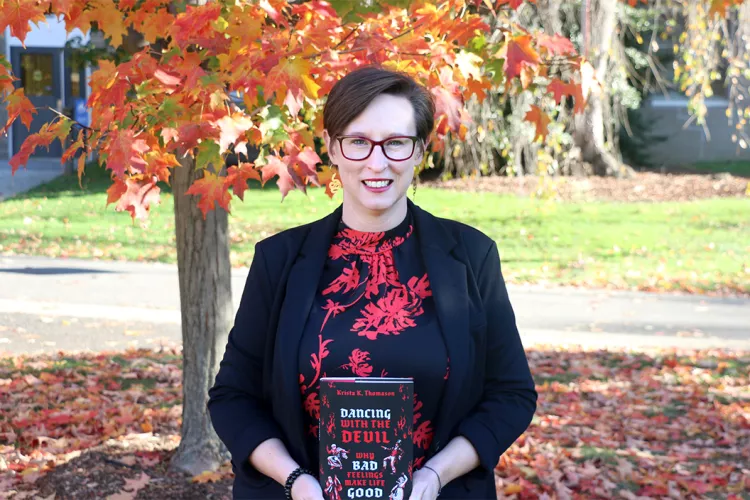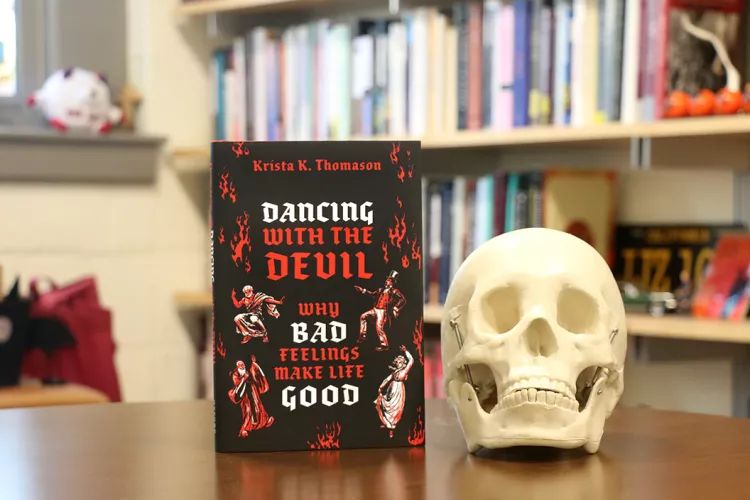Philosopher Krista Thomason Explores Enigmatic Value of Bad Feelings in New Book

“Philosophers for a long time have argued that emotions are ways of caring about things,” says Thomason. “If something matters to you, your emotions will show it. Negative emotions work the same way."
Negative emotions might not be as menacing as we’ve been led to believe, according to Krista K. Thomason, associate professor of philosophy. In Thomason’s latest book, Dancing with the Devil: Why Bad Feelings Make Life Good, she deciphers the enigmatic value of bad feelings, offering philosophy as an avenue toward better understanding them.
Dancing with the Devil serves as a sort of grimoire, a manual that equips readers to discern, appreciate, and summon their inner demons. The demons she names are the oft-dreaded anger, contempt, envy, jealousy, schadenfreude, and spite. Thomason contends that we should embrace bad feelings — dancing with them rather than contorting them. She likens negative emotions to the worms in a garden; repulsive as they may be, they’re necessary for the health of our emotional soil.
Thomason invites the reader to imagine what would happen if, instead of looking at negative emotions as things to overcome, they were treated just like positive ones. No one warns you against getting addicted to joy or gratitude, she explains.
“Philosophers for a long time have argued that emotions are ways of caring about things,” says Thomason. “If something matters to you, your emotions will show it. Negative emotions work the same way. They’re ways of caring about you. You'll be angry when you feel slighted or hurt, you'll be envious when you see someone enjoying something that you want, and you'll feel spiteful when someone tries to butt into your business.”
Using philosophy, literature, and psychology, Thomason challenges conventional notions of wellness. With her accessible narrative style, she interprets the writings of philosophers including Aristotle, Confucius, Kant, and Nietzsche in a way that is approachable for people from a variety of philosophical backgrounds, including novices.
The book title is a nod to a lyric in Motörhead’s hedonistic "Ace of Spades." The band’s lead singer Lemmy Kilmister revels in the pleasure of risk:
“Playing for the high one, dancing with the devil
Going with the flow, it's all a game to me
Seven or eleven, snake eyes watching you
Double up or quit, double stake or split.”

In addition to the book title and the cover art, reminiscent of a 1980s metal band T-shirt, the whole of the book is infused with the spirit of metal music. While writing Dancing with the Devil, Thomason listened exclusively to her favorite metal bands, including Black Sabbath, Iron Maiden, Judas Priest, Mastodon, Slayer, plus hair metal bands like KISS, Mötley Crüe, and Skid Row. In an innovative twist, she has provided a soundtrack for the book by creating Spotify playlists that correspond with each chapter.
Chapter 2, “Taming the Beasts,” corresponds with Mastodon’s Hushed and Grim album, which Thomason says she listened to repeatedly while writing the chapter. With song titles like "The Beast," "Eyes of Serpents," "Savage Lands," and "Skeleton of Splendor," the album fits well with Thomason’s analysis of how we’ve been “steeped in the belief that negative emotions will cause chaos if we don’t do something about them.”
We do not have to get rid of, manage, or train our negative emotions, says Thomason. “Negative emotions are in your life because your life matters to you, and there’s nothing wrong with that.”
Dancing with the Devil doesn’t just normalize negative emotions, it celebrates them as integral aspects of a full life.



